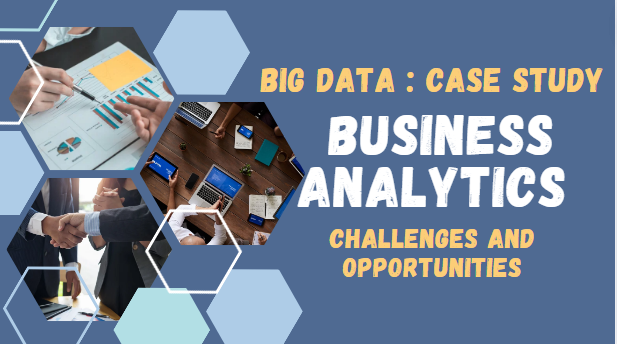
In today’s digital world, data is everywhere. From social media to online shopping, we generate massive amounts of information daily. This explosion of data, often called “big data,” is changing how businesses operate. It offers incredible opportunities for insights and decision-making but also comes with its own set of challenges. Let’s dive into how big data impacts business analytics, the hurdles it presents, and the opportunities it creates.
The Power of Big Data
Big Data refers to large, complex datasets that businesses can analyze to uncover trends, patterns, and insights. This data can come from various sources, including social media, transaction records, and sensors. The sheer size and variety of big data mean it can provide deep insights into customer behavior, market trends, and more.
Opportunities with Big Data
Better Decision-Making
One of the biggest advantages of big data is the ability to make more informed decisions. By analyzing large datasets, businesses can identify patterns and trends that help them understand what works and what doesn’t. For example, retailers can look at customer purchase histories and online behavior to predict future trends, helping them stock the right products and tailor their marketing strategies.
Personalized Customer Experiences
Big data helps businesses understand their customers better. By analyzing data from different touchpoints, companies can create detailed customer profiles and offer personalized experiences. For instance, streaming services like Netflix use big data to suggest movies and shows based on your viewing history, making the experience more enjoyable and engaging.
Operational Efficiency
Businesses can use big data to streamline their operations. By analyzing data from various processes, they can find inefficiencies and areas for improvement. For example, manufacturers can use data to spot bottlenecks in production and optimize their workflow, saving time and money.
Innovation and New Business Models
Big data can drive innovation by revealing new opportunities. Businesses can explore new markets, develop new products, or even create entirely new business models based on insights from data. Ride-sharing companies like Uber, for example, use big data to optimize routes and pricing, transforming the transportation industry.
Challenges of Big Data
Despite its benefits, big data comes with challenges that businesses must address to make the most of it.
Data Volume and Storage
The sheer amount of data can be overwhelming. Storing and managing this data requires significant infrastructure, such as cloud services or physical servers. As data volumes grow, businesses need scalable solutions to handle the increase.
Data Quality and Accuracy
For big data to be useful, it must be accurate and reliable. However, big data often includes messy or incomplete data. Inaccurate data can lead to incorrect insights, so businesses must invest in processes to clean and validate their data.
Data Integration and Silos
Data often comes from various sources, like social media, internal systems, and external partners. Bringing all this data together into a cohesive system can be challenging, especially if different departments keep their data separate. These “data silos” can prevent businesses from getting a complete picture.
Privacy and Security
With big data comes the responsibility to protect sensitive information. Data breaches and privacy concerns are real risks, so businesses must implement strong security measures and comply with regulations like the GDPR. Protecting customer data isn’t just a legal requirement; it’s also crucial for maintaining trust.
Skilled Workforce
Working with big data requires specialized skills in data science and machine learning. There’s currently a shortage of professionals with these skills, making it difficult for businesses to find the right talent. Investing in training and development is essential to building the necessary capabilities.
The Future of Big Data in Business Analytics
Despite these challenges, the future of big data in business analytics is bright. Advances in technology, such as artificial intelligence and machine learning, make it easier to analyze large datasets and uncover valuable insights. As these technologies evolve, businesses will be able to process and analyze data more efficiently, leading to new opportunities for growth and innovation.
Cloud computing and edge computing are also providing more scalable and flexible solutions for managing big data. These technologies allow businesses to process data closer to the source, reducing delays and enabling real-time analytics.
Conclusion
Big data has the potential to revolutionize business analytics by providing deeper insights and better decision-making. While there are significant challenges in handling large datasets, the opportunities are immense. Businesses that can overcome these challenges and effectively use big data will be well-positioned to succeed in the digital age, driving innovation and gaining a competitive edge.
The MITSDE Advantage in Business Analytics
If you want to learn about big data and become good at business analytics, the MIT School of Distance Education (MITSDE) has courses that are perfect for you. MITSDE offers a variety of programs, including special courses in business analytics, that teach you how to work with large amounts of data and find useful information. The classes cover important topics like finding patterns in data, analyzing statistics, using machine learning, and creating data visuals.
MITSDE makes learning practical by including real-life case studies and projects, so you can practice what you learn. The courses are also flexible, meaning you can study without leaving your current job. With experienced teachers and great support, MITSDE is a great place to improve your skills. By studying at MITSDE, you’ll be ready to handle big data and take on exciting new challenges in the world of business analytics.



